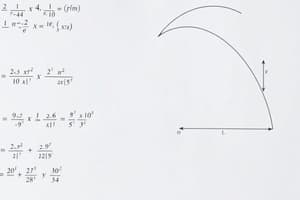Podcast
Questions and Answers
What is the axis of symmetry?
What is the axis of symmetry?
A line that divides a plane figure or a graph into two congruent reflected halves.
What is the equation for finding the axis of symmetry?
What is the equation for finding the axis of symmetry?
x = -b/2a
What is the maximum value?
What is the maximum value?
The largest value in a set of data.
What is the minimum value?
What is the minimum value?
What shape does a parabola represent?
What shape does a parabola represent?
What is a quadratic function?
What is a quadratic function?
What is the vertex form of a quadratic function?
What is the vertex form of a quadratic function?
What is the vertex of the parabola?
What is the vertex of the parabola?
What is the standard form of a quadratic function?
What is the standard form of a quadratic function?
What is the difference of two squares?
What is the difference of two squares?
What does factoring mean?
What does factoring mean?
What is the greatest common factor?
What is the greatest common factor?
What is a perfect square trinomial?
What is a perfect square trinomial?
What is a zero of a function?
What is a zero of a function?
What is the Zero-Product Property?
What is the Zero-Product Property?
What is a discriminant?
What is a discriminant?
What is the quadratic formula?
What is the quadratic formula?
What is completing the square?
What is completing the square?
How do you find the number of solutions of a quadratic equation?
How do you find the number of solutions of a quadratic equation?
What is a domain in relation to a quadratic function?
What is a domain in relation to a quadratic function?
What is the range of a quadratic function?
What is the range of a quadratic function?
Flashcards are hidden until you start studying
Study Notes
Quadratic Functions and Equations Key Terms
-
Axis of Symmetry: A line that divides a parabola into two mirrored halves, essential for graphing quadratic functions.
-
Axis of Symmetry Equation: Calculated using the formula x = -b/2a; determines the vertical line that runs through the vertex.
-
Maximum Value: The peak point of a quadratic function; represents the largest output of the function.
-
Minimum Value: The lowest point of a quadratic function; indicates the smallest output of the function.
-
Parabola: The graphical representation of a quadratic function, characterized by its U-shaped curve.
-
Quadratic Function: A polynomial function where the highest exponent is 2, generally expressed as y = ax² + bx + c.
-
Vertex Form: A way of expressing a quadratic function, given by the equation y = a(x - h)² + k, where (h, k) is the vertex.
-
Vertex of the Parabola: The turning point of the parabola, indicating either the maximum or minimum value depending on the orientation of the parabola.
-
Standard Form: A typical expression format for linear equations, represented as Ax + By = C.
-
Difference of Two Squares: A special product result allowing the factoring of expressions in the form a² - b² as (a + b)(a - b).
-
Factoring: The process of breaking down a polynomial into simpler components that, when multiplied together, yield the original polynomial.
-
Greatest Common Factor (GCF): The largest shared factor of two or more numbers, useful in simplifying expressions.
-
Perfect Square Trinomial: A trinomial that results from the square of a binomial, formatted as (a ± b)².
-
Zero of a Function: A value of x for which the function f(x) equals zero; the x-intercepts of the graph of the function.
-
Zero-Product Property: If the product of multiple factors equals zero, at least one factor must also be zero; a fundamental concept in solving polynomial equations.
-
Discriminant: A calculated part of the quadratic formula (b² - 4ac) that indicates the nature and number of roots of the equation.
-
Quadratic Formula: An essential formula for finding the roots of a quadratic equation: x = (-b ± √(b² - 4ac)) / (2a).
-
Completing the Square: A method for transforming a quadratic expression into a perfect square trinomial to simplify solving.
Understanding Solutions and Function Characteristics
-
Finding the Number of Solutions: Analyze the discriminant; if it's positive, there are two distinct solutions, if zero, one solution, and if negative, no real solutions.
-
Domain: Refers to all possible x-values for the quadratic function, typically all real numbers.
-
Range: All potential y-values of a quadratic function, determined by the direction of the parabola (upward or downward based on the coefficient a).
Studying That Suits You
Use AI to generate personalized quizzes and flashcards to suit your learning preferences.




